Scroll down to find a full transcription of this Happiness Break.
Letting go of our regrets can motivate us to improve and help us grow. Alex Elle, a certified breathwork and writing coach, guides us through a meditation to forgive and accept ourselves.
Link to episode transcript: https://tinyurl.com/5dzrzm4z
How to Do This Practice:
1. Take a deep breath. As you exhale, remember all you have done in the past that led you to come to be where you are today.
2. Remember that you are allowed to forgive yourself and let it go. Give yourself permission to release any shame that you’re carrying. Forgive yourself.
3. Think of the good things about yourself. Trust your worth and acknowledge that you are evolving. Remember, you are worthy of good things even when you think you are now.
4. When you’re ready, you can bring your attention back to the present moment. Take a few deep breaths in through the nose, and out through the nose. Drop your shoulder and unclench your jaw.
5. If you’d like to take this practice a step further, you can write your own letter of self forgiveness, it can start with “Dear self, I forgive you for …”
Today’s Happiness Break host:
Alex Elle is a certified breathwork coach, author and restorative writing teacher. Her new book, How We Heal, will come out soon.
Science of Happiness Episodes like this one
Happiness Break Related Episodes
Message us or leave a comment on Instagram @scienceofhappinesspod. E-mail us at happinesspod@berkeley.edu or use the hashtag #happinesspod.
Help us share The Science of Happiness! Leave us a 5-star review on Apple Podcasts or share this link with someone who might like the show: https://tinyurl.com/2p9h5aap
Transcript:
Dacher Keltner I’m Dacher Keltner, welcome to Happiness Break, a series by The Science of Happiness where we share research-backed practices to give you a boost in your day, all in under 10 minutes. Today we’re doing a guided practice in self-forgiveness. A gentle reminder to give ourselves the compassion that we so readily give other people.
We know from research from my colleagues here at UC Berkeley that practicing self-compassion helps us grow from our regrets. We’re more accepting about whatever it is that happened, and that acceptance leads to a motivation to improve. Self-forgiveness also supports our parasympathetic nervous system, including the vagus nerve, which as you may know, regulates heart rates and is a key player in our social connections.
Guiding us in today’s meditation is Alex Elle. Alex is a certified breathwork coach, author and restorative writing teacher. I hope you enjoy this practice.
Alex Elle Hello everybody. I hope you enjoy this note to self on forgiveness. Dear self, the pain from old wounds can sometimes linger, and cling to you like a second skin that you can’t seem to outgrow. Perhaps even make you want to forget who you are and who you were, and all it’s taken to get here. But I’d like for you to breathe into the fact that you are still standing, and I am proud of you and who you’re becoming.
There’s an air of self-awareness that you’ve grown to know deep in your bones. And on every exhale I hope you remember that. Where you’ve been and what you’ve walked through has shaped each footstep that you’ve left behind. There will be times in this journey where even though you’ve reached new heights in your quest and have come so far, some feelings of regret will start sprouting up. In those moments I invite you to breathe through that. We cannot ignore the pain of our past. We cannot pretend that the aching doesn’t exist. Breathe through it all and remember to cry. Give it a life. And let it go.
Perhaps what scares you the most is not having that lingering feeling of suffering, waiting for you to drop the ball. But remember: you are worthy of good things. Even when you fail. Transformation comes in waves. Deep down, you are a work of art and you know it. Abstract. Filled with meaning and discovery. You are allowed to let your guard down. You are allowed to become friends with self-forgiveness. You are braver than you think. Softer than you know. And more resilient than you let yourself see.
I am proud of you for trying. It’s a challenge to create a new narrative sometimes. To forgive is to let go. To let go is to release control and get acquainted with vulnerability and courage. Opening your heart to the unknown is a challenge. But you’re working on it. And you’re working through it. Give yourself permission to release any shame that you’re carrying. Forgive yourself, even for the things that you hold with deep remorse. You are not who you used to be. You are more than your mistakes. Your past was practice, and everything you’ve walked through has helped you get to where you are today.
Remember that you owe yourself the same tender heartedness that you think others deserve. Trust your worth. Know it and own it. Even when the damage runs deep. I hope you take a moment to be gentle with yourself. You are ever evolving. Before you can start forgiving others, you have to learn how to forgive yourself. Self-forgiveness is an act of community service. It takes practice, deep breaths and dedication. It requires you to lean in and be truthful with everything that may sting.
Forgiveness is not a burden. It’s a blessing. And as you breathe through this moment, be flexible with your process. Give yourself permission to create a new path. Believe in your own life. You won’t always make the right choice or do the right thing, but your intention is pure. Trial and error creates space for fluidity and becoming your best self. As you sit with yourself in this moment, make room for flaws, give them air to breathe.
Stop hating yourself for failing and for not knowing. You are a work in progress. You are not broken. You are always whole, even when things feel like they’re falling apart. Start slow. There’s no need to rush your process or gather your feelings all at once. Forgive yourself for repeating the same thing and not learning from the past. To forgive yourself for the shame and guilt that you may be carrying still. Forgive yourself for not finishing what you started and having to begin again. Forgive yourself for self-sabotaging and settling and thinking that you weren’t good enough. You are. You are learning a new way now. Forgive yourself for staying too long when you should have left. Forgive yourself for not loving your body enough to value it as sacred. Forgive yourself for wasting time.
Self-forgiveness is the key to liberation. You are worthy of good things. Even when you think you are not. Remember, the sun will always emerge after the rain. You’ve just got to be committed enough to do the work while you wait it out. We are all doing the best we can with what we have. And I am so proud of you.
When you’re ready, you can bring your attention back here. And take a few deep breaths in through the nose, and out through the nose. Dropping your shoulder and unclenching your jaw. Giving yourself permission to lean into self forgiveness at this moment.
If you’d like to take this practice a step further, I invite you to write your own letter of self forgiveness. “Dear self, I forgive you for …” And see where your thoughts and breath take you. My name is Alex Elle. Thank you so much for joining me today.
Dacher Keltner Alex Elle is a certified breathwork coach, author and restorative writing teacher. You can learn more about her work by visiting our show notes wherever you’re listening now. We’ll share this self-forgiveness meditation there.
I’m Dacher Keltner, thanks for taking this Happiness Break with us. If Alex’s meditation inspired you to write your own letter of self-forgiveness, we’d love to hear how that experience was for you. Email us at happinesspod@berkeley.edu or use the hashtag #happinesspod.
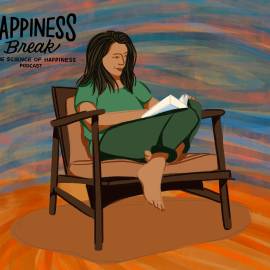
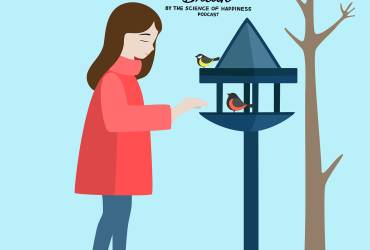
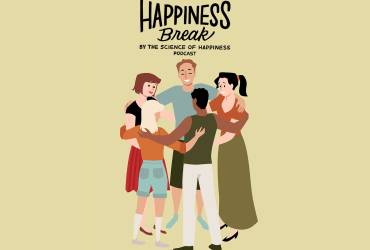
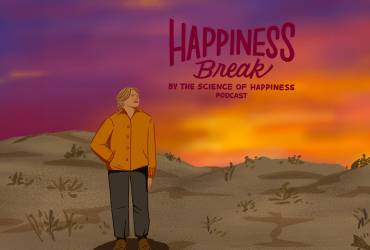

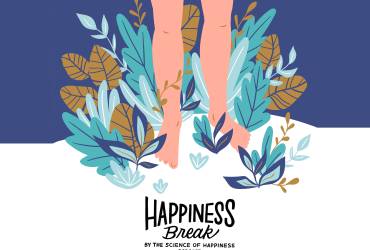
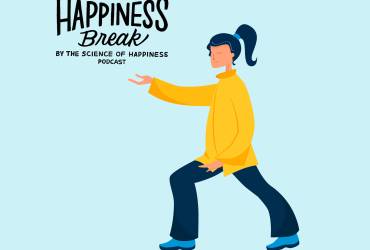

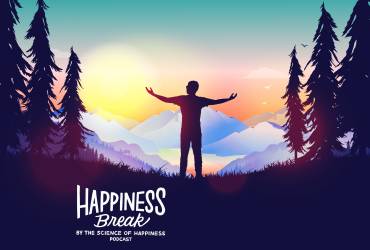
Comments